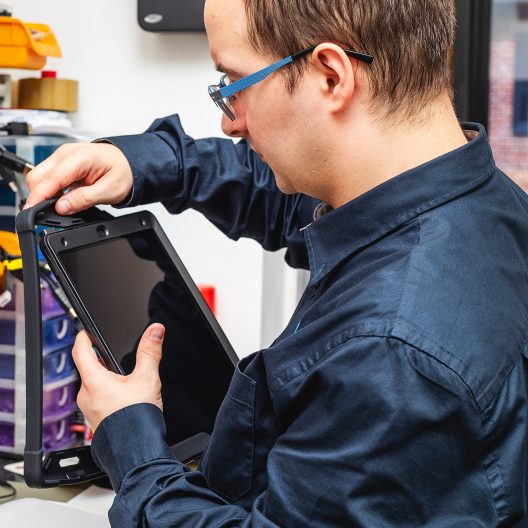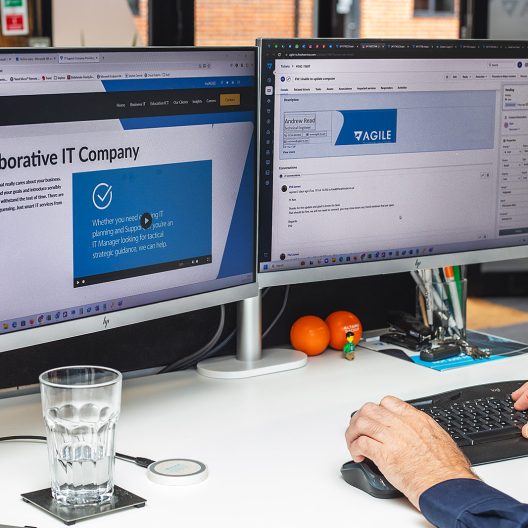IT’S ALL IN THE PLANNING
We know that an IT disaster recovery plan is different for every organisation. Admittedly, there are similarities in IT infrastructure and cloud disaster recovery solutions. But as every business is unique, recovery solutions should be too.
Our IT infrastructure and website disaster recovery plans are built on this basis. Our IT disaster recovery plan always starts with us safely testing your existing data recovery solutions to discover if they work. From there, we’ll assist you with implementing a data recovery solution we know will restore your workloads and critical data in the event of an outage.
But like all technology solutions, IT disaster recovery management is an ongoing process. For many of our clients, we routinely test their data disaster recovery plan and run full disaster recovery simulations.
Our disaster recovery solutions typically involve a combination of the following:
-

Agile OBS+ Online Backup
A fast, affordable, high-performing online IT disaster recovery solution for Hyper-V or VMware. Easy to implement, feature-rich with Rapid Restore functionality, restoring your data in the same day.
-

Agile Virtual Disaster Recovery Simulation Pro
Know, with certainty, how long it will take to recover your system. We will restore your entire system into our Disaster Recovery Platform to accurately stress-test your IT infrastructure, services and data recovery.
-

Agile Private Cloud Server
Avoids the need for a one-off capital spend. With Agile’s dedicated connectivity and hardware in a secure location in Colchester, have your own private cloud as part of your cloud disaster recovery solution.
-

Agile DRaaS Elite
Replicate and host physical or virtual servers to provide failover in the event of a business disaster. Agile’s Disaster Recovery as a Service Elite replication model for Hyper-V is a fraction of the cost of traditional DRaaS solutions.
Local areas we already cover.
Based just off the A12 on the outskirts of Colchester and a short journey from Ipswich, we provide IT disaster recovery solutions to a wide range of organisations throughout Essex and Suffolk. We consider it a privilege to safeguard so many businesses against unthinkable yet real threats. Please feel free to read our client case studies on our cloud disaster recovery solutions and threat management for on-premise solutions.
View case studiesBusiness Continuity FAQs
What is a Disaster Recovery Plan?
A Disaster Recovery Plan (DRP) is the term used to describe the plan for returning business operations to normal after a disaster. If daily business operations have been interrupted, your Disaster Recovery Plan will transition your continuity measures back to normal processes.
However, just 30% of businesses have an official Disaster Recovery Plan. One of the primary reasons for this is that too many assumptions are made. Many people confuse having a backup strategy with having a DRP. Sadly, this confusion contributes to 70% of small businesses ceasing within a year of a major data breach.
Do you know how long it would take your existing backup solution to restore all your data? How long could your business survive? These are answers you would confidently know if you had a Disaster Recovery Plan.
It’s much easier to consider the risks if you think of backup as a copy of your data and the Disaster Recovery Plan as the insurance that enables its recovery. At a minimum, your DRP should provide detailed answers to the following questions:
- Who should be involved in the planning?
- How will your business recover from infrastructure failure or data loss?
- Who will be responsible for recovery tasks?
- How frequently should we stress-test our DRP?
- Who will run the stress-tests?
An effective DRP is seldom handled purely in-house since it is a very specialist area of IT. That’s why partnering with specialist consultants like ourselves will give you absolute peace of mind.
What is a Business Continuity Strategy?
A Business Continuity Strategy must consider all possible eventualities that pose a risk to your business. Nobody saw the COVID-19 pandemic happening, but those who already had a business continuity strategy found the pivot to remote working easier.
Large global incidents aside, though, you need to ask yourself a series of questions when preparing a business continuity strategy. The list of scenarios could be anything from a flood through to your reliance on third-party suppliers and cyber-attacks.
It’s important to create a plan that is bespoke to your business. Here are some common things every business continuity strategy should plan for:
- Temporary change of premises
- Remote working for home (and now hybrid working)
- Data backups
- Reallocation of roles to staff
- Use of third-party contractors or suppliers as a fallback
- Ability to safeguard and restore personal data (to meet GDPR)
What is the difference between Business Continuity and Disaster Recovery?
It is easy to get business IT business continuity and IT disaster recovery solutions confused. For a start, they go hand-in-hand. Companies use both to prepare for a wide range of natural and human-made disasters.
However, they are not the same thing, and it’s very important not to confuse them.
It’s easierto think of an IT business continuity plan as a temporary solution to keep your business running and an IT disaster recovery solution as a way of returning everything to normal after the event.
How do Disaster Recovery plans work?
The purpose of an IT Disaster Recovery Strategy is to resolve the disruption. At a simple level, it involves identifying the cause of the business-critical problem and finding a way to return business operations to normal. It can, however, involve very complex technical solutions against a tight deadline. After all, every minute of downtime is a cost to a business.
A Disaster Recovery Plan will often include Recovery Time Objectives (RTOs) – these are time estimates to restore a product, service, or function to normal working order following an incident.
Take a fire, for example. A business should prepare for its servers being damaged (possibly beyond repair) and that its systems will need to be restored from a recent backup. The RTO details how long it would take to restore everything to enable people to work.
To restore a business to normal after an incident, many companies are now turning to DRaaS. This stands for Disaster Recovery as a Service. Essentially, it’s a category of Cloud computing that protects applications and data from a disaster or service disruption at one location by enabling a full recovery in the cloud. This means that your business can operate virtually, in a secure cloud location while your primary systems are restored.
At Agile Technical Solutions, we have our own DRaaS replication service. This involves replicating either your physical or virtual servers into our local data centre in Colchester, Essex. It’s a fraction of the cost of traditional IT disaster recovery solutions and DR systems.
How does a Disaster Recovery Plan help your business?
There are many benefits to having an IT Disaster Recovery Plan. In the event of a business-critical incident, you can expect to realise the following from having an effective IT disaster recovery strategy:
- Massively reduce your restoration time (the time it takes for you to operate as normal again)
- Limit financial fallout. Faster recovery and restoration time mean less business lost.
- Minimise disruption to business-critical processes. Your IT disaster recovery strategy should identify the most important business-critical functions and look to restore these as a priority.
- Limit reputational damage. How a business deals with an incident reflects on its brand. The sooner you can recover, the better you will be perceived by customers.
- Ongoing Disaster Recovery (DR) suitable to your business, provided you regularly stress-test your disaster recovery solution (ideally at least yearly).
We’re not just an IT Disaster Recovery business.
While most our clients trust our IT disaster recovery solutions to get them up and running quickly in the event of a disaster, we also provide a full range of related IT services, and these are:
 Our technical IT support capabilities can help all manner of IT-reliant businesses and in-house teams.
Our technical IT support capabilities can help all manner of IT-reliant businesses and in-house teams.
 We tailor our IT consultancy to meet your needs, from ad-hoc advice to full implementation.
We tailor our IT consultancy to meet your needs, from ad-hoc advice to full implementation.
 We proactively protect your organisation with the most effective business cyber security services.
We proactively protect your organisation with the most effective business cyber security services.
 Whether you’re looking to replace your entire IT network, need IT upgrades, or a server refresh, we can help.
Whether you’re looking to replace your entire IT network, need IT upgrades, or a server refresh, we can help.
 Our cloud solutions enable smarter employee collaboration, bigger data and vastly more scalable IT infrastructures.
Our cloud solutions enable smarter employee collaboration, bigger data and vastly more scalable IT infrastructures.
 Achieve the right balance between design, functionality and SEO, with bespoke web design and secure hosting.
Achieve the right balance between design, functionality and SEO, with bespoke web design and secure hosting.
Data Backup & Recovery Client Feedback

David, Richard Edwards Group“The IT solutions they have created for us range from disaster recovery to threat management and the team are always on hand to help when we have any issues. I would recommend Nick and the team to any business who has an upcoming IT Project or requires IT Support.”

Nicki, Headway Essex“The best advice I ever received was, “give Agile Technical Solutions a call”. So glad I did, they listen to our needs not just for today but forward plan and provide right tailored solutions, for our budget and the charity. IT is critical to the running of the organisation, and we can’t afford to be without it. I have found all the staff polite, helpful and always go the extra mile to resolve any issues, big or small. I wouldn’t hesitate to recommend and just want to pass on the same advice to you – Give them a call.”

Freeman Community Primary School“Agile is a nice, friendly group of people who fall over themselves to ensure all work is completed as quickly as possible and to the highest standards. Their customer support is always fantastic and as a result, we have a school of over 400 children who are benefiting hugely by our greatly increased and more reliable ICT package. We would recommend Agile without hesitation.”

Chelsey, Nayland Care“Agile have been taking care of our IT for many years now and we’d never go anywhere else. Their team of friendly and highly skilled IT consultants meet all of our business needs.”
Let’s work together
01206 700930We pride ourselves on our expertise
IT disaster recovery and business IT continuity planning require the ability to maintain essential functions during, as well as after, a disaster has occurred. That’s where our flexible IT financing solutions come in; with a monthly payment structure you can have a dedicated private cloud without the upfront cost.
Whether your business is starting an IT disaster recovery project, or if you need assistance with an IT disaster recovery strategy, we can help.
Simply reach out to us on 01206 700930 or send us a quick message using the form below.
